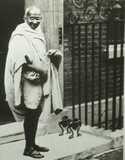Satyagraha
Table of contents
No headers Pila Mulligan, 4/25/09
A visitor to the group recently expressed an opinion that being untruthful was a necessary skill in the real world. The visitor was not present in a
subsequent session where the discussion progressed from the topic of being
truthful to stealing and killing. I wonder whether his opinion would have
persisted (saying that all of the above were necessary for worldly
success.) Many people have as little concern for stealing and killing as
they do for truth, including many people we may like to think have higher
values. In some government and business leadership circles, honesty is
not the best policy, and theft and violence as policy are discussed in a thinly
veiled context, if not openly. It is an unfortunate fact of history
that violence holds an elevated status in the realm of foreign policy, and
there are corresponding domestic policies of both government and
business. Ignoring truth and embracing theft and violence are
connected. After that first step is taken -- after one decides not to be truthful -- the path to lower steps on the ethical scale is open.
Ending violence is a daunting task. It may seem
simpler and easier to just fight fire with fire, especially if you have stronger force and strategy. But sometimes, as a civilization, we need
to work on the task of ending violence, not just winning with it. And
before we can do that, we need to embrace truth. Whether it is in
planning a business strategy, or analysis of a military situation, truth is an
essential tool. Without it, the grounds for planning and the plan's results are likely to be more confused.
 Gandhi's vigorously truthful plans
succeeded in obtaining the end of the British Empire in India.
“The term Passive Resistance does not fit the activity of the Indian
community during the past eight years. Its equivalent in the vernacular
rendered into English means Truth-Force. I think Tolstoy called it also
soul-Force or Love-Force, and so it is.” Satyagraha (or, truth in
action) was the name Gandhi gave his approach. “In the application
of satyagraha, I discovered in the earliest stages that pursuit of truth did
not admit of violence being inflicted on one’s opponent but that he must
be weaned from error by patience and compassion.” “The
Satyagrahi’s object is to convert, not to coerce, the
wrong-doer.” http://en.wikipedia.org/wiki/Satyagraha
Gandhi's vigorously truthful plans
succeeded in obtaining the end of the British Empire in India.
“The term Passive Resistance does not fit the activity of the Indian
community during the past eight years. Its equivalent in the vernacular
rendered into English means Truth-Force. I think Tolstoy called it also
soul-Force or Love-Force, and so it is.” Satyagraha (or, truth in
action) was the name Gandhi gave his approach. “In the application
of satyagraha, I discovered in the earliest stages that pursuit of truth did
not admit of violence being inflicted on one’s opponent but that he must
be weaned from error by patience and compassion.” “The
Satyagrahi’s object is to convert, not to coerce, the
wrong-doer.” http://en.wikipedia.org/wiki/Satyagraha
Gandhi used the Hindu term ahimsa for non-violence (a fundamental principle of Satyagraha.) Wikipedia says Ahimsa is “a Sanskrit
term meaning to do no harm” – http://en.wikipedia.org/wiki/Ahimsa
– that “is closely connected with the notion that all kinds of
violence entail negative karmic consequences.” The first of the
Five Precepts of Buddhism is a commitment to abstain from killing, as Stim's sessions have discussed. It is a prevalent moral idea in many religions (e.g., “thou shall not
kill”.) Some scientists theorize that evolution compelled early
humans to recognize how social living requires empathy (i.e., a community is
better able to survive if it embraces compassionate ethical precepts.) The
human community is still learning this lesson, and embracing truth is a first
essential step. History shows a gradual curve of progress toward peacefulness. Violence is civilization's big problem. Truth is an essential ingredient in the remedy.
- Tag page (Edit tags)
- What links here
Files 1
| File | Size | Date | Attached by | |||
|---|---|---|---|---|---|---|
| Gandhi.jpg No description | 101.48 kB | 18:40, 21 Nov 2010 | Pila Mulligan | Actions | ||

